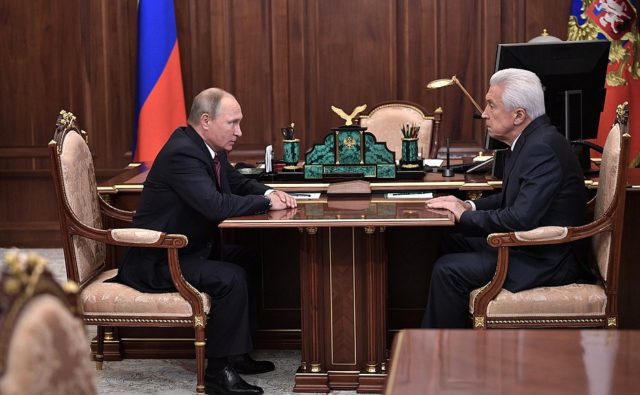
Vasilyev’s Much-Ballyhooed Cadres Revolution in Dagestan Has Not Happened
Publication: Eurasia Daily Monitor Volume: 15 Issue: 52
By:

When, in October 2017, Russian President Vladimir Putin appointed Vladimir Vasilyev to take over from Ramazan Abdulatipov as head of the North Caucasus republic of Dagestan, there were widespread hopes and fears that Vasilyev would transform the local political elite by a wholesale replacement of the senior officials. Many of them had been in place for decades. And when the new Dagestani leader ordered the arrest of the republic’s prime minister, several deputy ministers, and other senior officials and brought in outsiders from Tatarstan to replace them (see EDM, March 13), many felt that he was on his way to doing just that. But now, Vasilyev has announced his new council of ministers, and all but a handful are people who have been at the top of the Dagestani political system for decades. They had survived Abdulatipov’s earlier efforts to change things, and now have apparently escaped Vasilyev’s own anti-elite campaign (OnKavkaz, March 27).
This raises three obvious questions: Why has Vasilyev not been able to shake things up more, even in terms of top officials? What has he actually done to change things in Makhachkala? And what does this say about the real meaning behind Moscow’s appointing outsiders to head regions and republics?
The answer to the first question is simple and was recently explained by Aleksey Makarkin, a Moscow-based analyst who heads the Center for Political Technologies. In an interview with Gazeta.ru, he said that, despite some fundamental changes in the way Vasilyev has conducted business in Dagestan, including bringing in a few outsiders and having federal agencies investigate current officials for corruption and other forms of malfeasance, “there will not be a change of elites because there are no others available.” He suggested that “one can speak about a redistribution of resources within the elite. Some will leave, others will land behind bars, but the majority in one way or another are already adapting” (Gazeta.ru, February 27).
In that regard, Arsen Malikov of the OnKavkaz web portal noted that Vasilyev finds himself in much the same position Abdulatipov did at the start of his term. Like his predecessor, he was widely expected to be a new broom and transform one of the most insular and corrupt regions in the Russian Federation. But again like Abdulatipov, after a few high-profile dismissals and arrests, Malikov stated, “Vasilyev today is proceeding along exactly the same path” that his predecessor followed and that led to his disgrace and removal (OnKavkaz, March 27). Apparently, the new republic head has little choice: under the Putinist system, which precludes the formation of a new elite to replace the old one, there is simply no alternative local elite to tap in Dagestan. Consequently, anyone put in charge has no possibility of supplanting, at least on a wholesale basis, members of the existing one.
The answer to the second question—how has Vasilyev changed the situation?—is more complicated. As an outsider with no roots in Dagestan’s multi-ethnic and clan-based politics, Vasilyev has implicitly delivered three messages that matter: First, he has signaled that he does not intend to be a prisoner of intra-republican clan politics but rather plans to reduce the importance of ethnic and family ties among local officials. That has transformed the tone in Makhachkala, even if it has not changed personnel very much. Second, he has brought in federal law enforcement agencies to investigate officials, relying on their findings to send a small number of the incumbents to prison. This has sent the message that those who engage in corruption, at least on a massive scale, can expect the same fate unless they show loyalty to Moscow and the republic head. And third, Vasilyev has been quite willing to recruit people from beyond the borders of Dagestan—particularly from Tatarstan—for a limited number of top posts, an indication that he would like to run the republic as if it were one federal subject among many, rather than a unique one. That offends many Dagestanis, even those who want change. Still, Vasilyev’s failure to clean house below these outsider officials makes their arrival less significant, at least in policy terms, than he and others had expected.
But it is the answer to the third question—what does the Dagestan case say about Putin’s proclivity to impose outsiders on the regions and republics of the Russian Federation to ensure that his will is carried out?—that is the most important. Vasilyev’s experience strongly suggests that Putin’s strategy in this regard almost certainly will be less important than many in Moscow assume. Installing an outsider does shake things up; but rapidly and despite media hoopla, the new man finds that he is far more dependent on the existing local elite than he or the Kremlin might have imagined. Indeed, it is even possible that the new man will be captured by the locals, who not only know the situation on the ground better than he does, but have reason to join ranks to protect their positions—not just by showing cooperation with the outsider, but also continuing to work with their own people in ways that will oppose him. And such realities send a message to Moscow, the federal subjects, and outside analysts: introducing “Vikings,” as the Russians call these new men from outside, may look dramatic for a time but will not necessarily bring the changes the new men and their sponsors expect.
As Makarkin pointed out, “In Dagestan now, tectonic changes are taking place in the organs of the state administration. But in that republic, there is not going to be some 1937 [the height of the Stalinist purges]; and if one considers the elite as a whole, then the changes will be significantly less” than advertised (Gazeta.ru, February 27). Both the Kremlin and even more the regions will be taking note of that.



